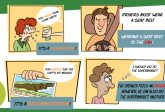Time Expressions and Tenses
When we learn a language, making mistakes is part and parcel of the process. Many mistakes we make are a result of interference from our own language. Interference in this sense is when we use words and structures from our native language in the language we are learning. We often do this unconsciously. It’s just the way our brain works.
One area where interference is very common is in the use of prepositions. Our brain will automatically use the same preposition in the new language as we use in our native language. This is not a problem if the preposition is used in the same way in both languages. However, when this is not the case we often use the wrong preposition in the new language.
An example of this is using the prepositions for an since to talk about time. In this blog post I will be looking at for and since as well as other expressions we use to talk about time and the tenses we use with these expressions. Let’s get going!
Present Simple
When we make present simple statements we use time expressions including:
Today Every morning Every afternoon
Every evening Every night At the weekend
On Mondays On Saturdays In the morning
In the afternoon In the evening At night
Always Often Sometimes
Rarely Hardly ever Never
For example:
I take a shower every morning
He visits his parents at the weekend.
She has classes in the afternoon.
We rarely go to the theatre.
Past Simple
When we make past simple statements we use time expressions including:
Yesterday Yesterday morning Yesterday afternoon
Yesterday evening
One month ago Two years ago Three weeks ago
Four seconds ago Five decades ago
Last month Last week Last year Last night
Last October Last Saturday Last Tuesday evening
Using the past simple tense together with these expressions tells us that the action is finished and when the action happened.
For example:
She was late for work yesterday morning.
They went on holiday last August.
I started my new job three months ago.
We had a meeting last Monday afternoon.
Present Continuous
When we make present continuous statements we use time expressions such as:
Now Right now At the moment
At present Today All day
For example:
John is eating his lunch now.
Linda is working at the moment.
We are leaving right now.
Past Continuous
When we make past continuous statements we use time expressions such as:
At 7pm last night At 4am this morning At lunchtime yesterday
We can also use the past continuous with a clause and a verb in the past simple tense – for example:
Before I started school Before I went to Germany
When I watched a film
Here are examples:
I was sleeping at 4 am this morning.
It was raining before I started school.
Sue was driving to work when she heard the news.
Future
When we make future statements we use time expressions such as:
Tomorrow Tomorrow morning Tomorrow afternoon
Tomorrow evening Tomorrow night
Next month Next year Next November
Next Christmas
In an hour In 2 days In 3 weeks
In 4 months In two days’ time In three weeks’ time
For example:
John will do the shopping tomorrow morning.
I will help you tomorrow evening.
We are visiting my parents next month.
For
Now let’s learn how to use the time expression for.
We use the time expression for to communicate a period of time, the duration of something that happens.
We can use the time expression ‘for’ with all grammar tenses
For example:
In the present simple: I work everyday for 8 hours.
In the past simple: He played football for 2 hours last night.
In the present continuous: She is taking an exam for one hour.
In the past continuous: They were walking for 20 minutes.
In the future simple: The students will study for 45 minutes.
In the past perfect: We had waited for 10 minutes when the bus arrived.
In each example sentence we used for because we wanted to speak about a period of time or the duration of an event.
In each example here, the amount of time has been represented by numbers – one hour, 20 minutes etc. There are some other expressions we can use with for, such as:
I haven’t seen you for ages.
They’ve been living in that house for a very long time.
These expressions also express a period of time.
'For' and the Perfect Tenses
Although we can use the time expression ‘for’ with any tense in English, this time expression is most commonly used with the perfect simple and perfect continuous tenses. This is because these tenses are generally used to talk about a period of time.
Here are some examples of sentences in the present perfect tense:
Jane has worked as a hairdresser for ten years.
Mike has played the piano for 15 years.
Judith has studied for 3 hours today.
And here are some sentences with the present perfect continuous:
The workers have been eating lunch for 30 minutes.
Paul has been living in Dublin for 4 months.
I’ve been waiting for half an hour.
'Since' and the Perfect Tenses
The time expression since is also commonly used with the perfect simple and continuous tenses. We generally do not use since with the present simple, present continuous, past simple and past continuous tenses.
We use the time expression since to speak about the point in time at which something began. For example, if I moved to Dublin in 2018 and it is now 2021, I can say:
I have been living in Dublin since 2018.
This has the same meaning as:
I have been living in Dublin for 3 years.
A common mistake that learners make is to say:
I have been living in Dublin since 3 years.
So remember:
For: period of time
Since: time when a period began.
We can use the time expressions ‘since’ with days. For example:
Since Monday Since Wednesday morning
Since Friday afternoon Since Sunday night
We can also use ‘since’ with times of day. For example:
Since 8am Since 3 o clock Since 7 o clock yesterday
Since 6pm Wednesday evening Since 11 o clock last night
We can also use ‘since’ with months and years. For example:
Since March Since July Since 1991
Since January 2001
We can also use ‘since’ with verbs in the past simple tense. For example:
Since I bought my car Since I finished work
Since we ate lunch
Here are some examples of present perfect sentences using the time expression ‘since’
John has worked here since Christmas.
Martin has lived in Texas since 1999.
The students have been studying since 9am.
Have they been on holiday since Monday?
Sam has been working from home since the lockdown began.
Jim and Ann have been married since 2010.
Test Yourself
Vocabulary
Unconsciously : Not aware of what you are doing.
Example: Most of the time we breath unconsciously.
Automatically: Without volition, do something by habit.
I automatically look at my mobile phone when I wake up in the morning.
Duration:The amount of time in which something occurs.
Example: The duration of a football match is 90 minutes.
Idioms
To be part and parcel of something: An essential component of something.
Example: If you work in a shop dealing with customers is part and parcel of the job.
To get going: To start an action.
Example: You’d better get going if you want to finish your homework today.
Thank you for reading our post. You’ll find more English grammar tips elsewhere on our site and if you’d like information on our English courses in Dublin, please do not hesitate to contact us.




